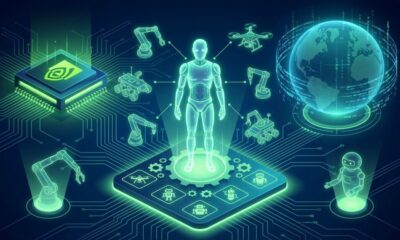Robotics
Researchers Develop Water-Driven Soft Robot Inspired by Sea Cucumbers

A team of researchers at the POSTECH’s Department of Mechanical Engineering has developed a water-driven self-operating soft actuator, and it is faster and stronger than conventional soft actuators. The team was led by Professor Dong Sung Kim, Dr. Andrew Choi, and Hyeonseok Han.
The research was published in the Journal of Materials Chemistry A.
MCT and Sea Cucumbers
The new development was inspired by the mutable collagenous tissue (MCT) of sea cucumbers. A sea cucumber’s body is made of MCT, which enables it to harden or soften depending on the surrounding environment. The elastic modulus of sea cucumbers are capable of changing up to 10 times in just a few seconds, and this is what allows them to fit through small crevices or inflate to threaten predators.They can do this by forming or destroying hydrogen bonds in collagenous tissues by controlling chemical regulators.
Actuators are rigid and can alter their physical states by using electrical signal change, similar to a motor or switch. Some soft actuators, on the other hand, are able to respond to water and use it as an energy source. For soft robotics that require freedom in movement, soft actuators can help in this regard. With that said, existing soft actuators are often fragile and slow, meaning they cannot be applied effectively.
Superior to Conventional Soft Actuators
The researchers were inspired by the MCT of sea cucumbers, which can freely change shape by reacting with water. They then developed an actuator that is programmable and based on the bulk PNIPAAm hydrogel, which is extremely flexible. It demonstrated an actuation force 200 times greater and 300 times faster than conventional soft actuators that rely on water as an energy source. These actuators are even able to use the water as a energy source when it is at 80 degrees celsius.
Through various tests, the actuator demonstrated that it was robust enough to restore the original shape when subjected to 300% of tensile strain.
According to the team, this actuator could be used in many different sectors, including the industrial and biomedical fields. It could also make a difference in industrial robots, more specifically, with grippers that act as a human arm and lift materials. This type of robot can also close wounds and act as artificial fingers.
“The soft robot activates when it comes in contact with moisture and is flexible and deformable to easily adapt to various environments,” explained Professor Dong Sung Kim. “This newly developed hydrogel actuator is very powerful and actuates quickly to enable operation even in places without electricity by using chemical energy.”
The research was supported by the Mid-career Researcher Program and the Core Technology Biomedical Development Program funded by the Ministry of Science and ICT and the National Research Foundation of Korea, and the Alchemist Project funded by the Ministry of Trade, Industry and Energy.












